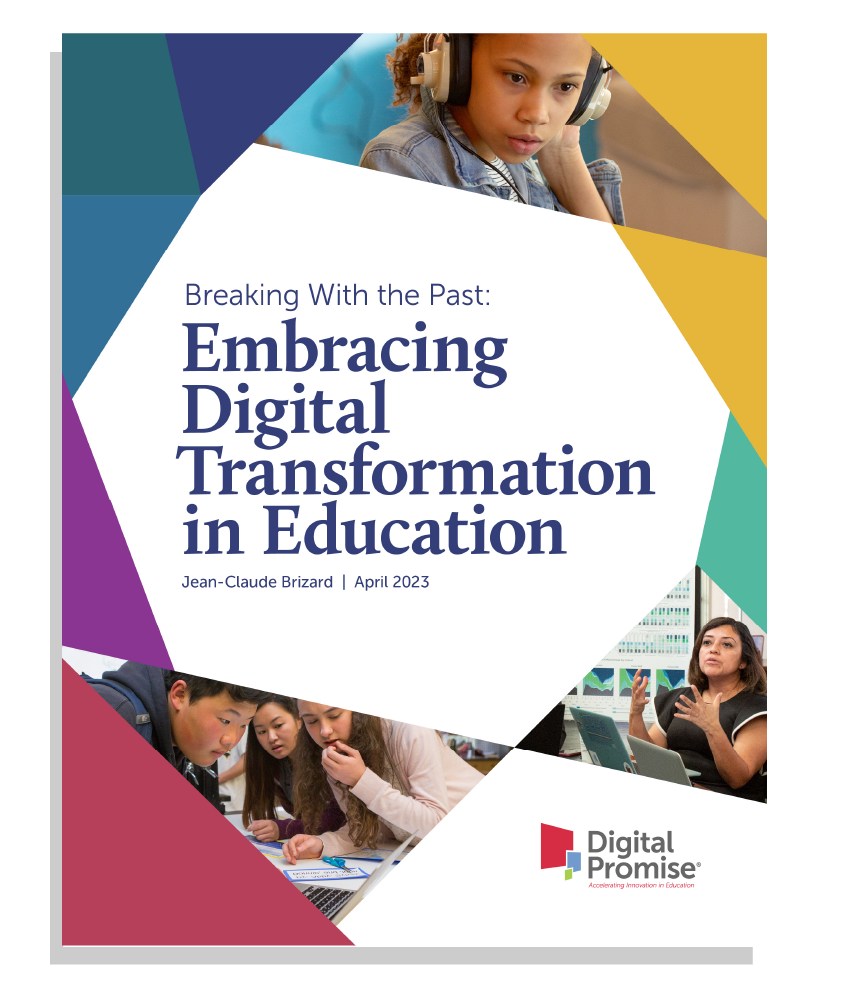Digital Promise’s belief that digital transformation must be the rule and not the exception across the country is the animating force for our report, “Breaking With the Past: Embracing Digital Transformation in Education.” It looks forward to the future when we will have harnessed the power of technology in a coherent and scaffolded way to solve longstanding challenges created by the traditional approach to education, including its inability to deliver equitable opportunities and outcomes generation after generation.
We need digital transformation of teaching and learning at scale across the United States.
Jean-Claude Brizard, CEO of Digital Promise and EDspaces 2024 Keynote Speaker
Throughout the years, the innovation of digital technologies has transformed entire industries. Now it’s time to put those technologies to use and apply that same mentality to transform our schools. At EDspaces 2024, I’ll discuss why the future of education must include the convergence of innovative school design, the science of learning and development, and the digital transformation of teaching and learning in order to unlock each student’s full potential. Here’s how:
Why We Need the Digital Transformation of Teaching and Learning
We need digital transformation of teaching and learning at scale across the United States. Digital transformation can and will pull K-12 education into new learner-centered constructs that accelerate learning and help close historic gaps. Moreover, it will ensure that schools are prepared the next time a natural disaster or health crisis disrupts in-person learning.
True digital transformation takes more than technology — it requires building capacity, know-how, and infrastructure, as well as shifting to a mindset that views technology not as a panacea, but rather as a powerful enabler that fosters deep integration of relationships between the teacher, learner, content, and family.
Provide a greater scale for effective learner-centered frameworks
The digital transformation of teaching and learning can pull us at greater scale into more effective learner-centered frameworks. Students pay the greatest price with the centuries-old approach to teaching and learning, and the results speak for themselves. Fortunately, digital technologies now enable constructs for K-12 education that learning sciences tell us are more effective: those that are more personalized and focused on the demonstration of competencies, rather than the acquisition of seat time. Furthermore, they allow us to pull records of student learning into new directions.
IDEA: Equip learners with the knowledge and skills to manage their lifelong learning data in Learning and Employment Records (LERs) where they can curate their competency-based micro-credentials, certifications, and awards from inside and outside of school.
Address historic inequities and close learning gaps
The digital transformation of teaching and learning can provide schools with the means to more effectively address historic inequities in educational opportunity and close learning gaps. High-speed internet is now accessible in almost every American school, but that alone is not enough to address educational inequities. To address this, districts must intentionally harness the power of technology for learners who have been historically and systematically excluded — and luckily, districts across the United States, such as Talladega County Schools in rural Alabama, are stepping up to meet this challenge.
IDEA: Use artificial intelligence to assist teachers in assessing and adjusting lessons in real time. This effectively accelerates the learning process, making it possible for learners who are behind to catch up more quickly.
Better prepare for future disruptions
The digital transformation of teaching and learning will better prepare us for future disruptions. Adaptability is a major cornerstone of digital transformation in K-12 education. The capacity for schools to evolve with and stay ahead of the technology curve is critical not only for facilitating digital transformation, but also for sustaining it.
IDEA: Leverage the Infrastructure Investment and Jobs Act to subcontract with internet service providers (ISPs) and other partners to extend internet service to underserved communities.
Change systems and the educational ecosystem
The digital transformation of teaching and learning can pull systems and the educational ecosystem into new constructs. Teachers cannot achieve this transformation on their own. They need the human touch of professionals and/or policymakers in state agencies, school districts, teacher preparation programs, philanthropy, and the nonprofit and edtech communities, who will create coordinated systems and an education ecosystem to support teaching and learning in the digital age.
IDEA: Invest in digital learning coaches who can provide teachers with the pedagogical support they need to effectively leverage technology to support learner variability in the classroom.

Looking Forward
The nation’s learners can’t wait for many more tomorrows to come and go without a broad national commitment to breaking the outmoded framework for American education and replacing it with frameworks that are more learner-centered, personalized, and effective. Digital technologies applied skillfully to teaching and learning might deliver on that possibility at long last.

